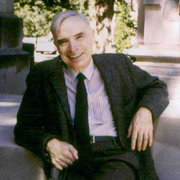On Wednesday, May 14, the public is invited to a special event honoring late professor and renowned scholar, Ian Barbour. Entitled “Ian Barbour and the Future of Religion and Science,” the event celebrates the intellectual legacy of long-time Northfield resident and internationally respected theologian Ian Barbour, the Carleton College Winifred and Atherton Bean Professor of Science, Technology and Society, Emeritus, who passed away in December 2013. This event will take place in the Weitz Center for Creativity Cinema from 7:30 to 9 p.m. and is free and open to the public.
For decades, Barbour engaged in conversations and taught courses, to both undergraduate students as well as local retirees through Northfield’s Elder Collegium, designed to tackle the difficult questions concerning the relationship between religion and science. In that same tradition, “Ian Barbour and the Future of Religion and Science” will bring together five nationally renowned scholars who will address questions about evolution, technology, and ethics. Each speaker will discuss the ways Ian Barbour’s work influenced their scholarly field and shaped their research in environmental ethics, the impact of technology on human values, and evolution and faith.
Participating panelists include: Philip Clayton, Ingraham Professor of Theology, Claremont School of Theology, who speak on theological perspectives in relation to religious pluralism and dialogue; Celia Deane-Drummond, Professor of Theology, University of Notre Dame, speaking on the relation between humans and animals, viewed from an evolutionary perspective and in terms of theological questions about the uniqueness of human beings; Nancy Howell, Professor of Theology and Philosophy of Religion, St. Paul School of Theology, who will address the impact of Ian Barbour’s work on feminist theology and environmental ethics; Ted Peters, Distinguished Research Professor of Systematic Theology, Graduate Theological Union (Berkeley) and Pacific Lutheran Theological Seminary, speaking about the ethical debates that emerge in relation to stem-cell research, and reflecting on the importance of such research from a theological perspective; and Bob Russell, Founder, Center for Theology and the Natural Sciences (Berkeley), Ian G. Barbour Professor of Religion and Science, Graduate Theological Union (Berkeley), who will address the importance of Ian Barbour’s methods for bringing religion and science in dialogue, and will speak about new questions and methods related to science and theology.
Ian Barbour came to Carleton in 1955 with the founding of the College’s religion department. In the 1970's, he co-founded the Science, Technology, and Public Policy program, which later became ENTS (Environment and Technology Studies). He retired in 1986 as the Winifred and Atherton Bean Professor of Science, Technology and Society, Emeritus.
Barbour is widely credited with being the creator of the current international dialogue between science and religion. With his degrees in theology and physics, he explored the theological implications of science and methodological issues in both fields. He wrote or edited sixteen books, including Christianity & the Scientists (1960), Issues in Science and Religion (1966), Science & Secularity: The Ethics of Technology (1970), Myths, Models and Paradigms (1974), Religion and Science: Historical and Contemporary Issues (1997), When Science Meets Religion (2000), and Nature, Human Nature, and God (2002).
From 1989 to 1991, he gave the Gifford Lectures at the University of Aberdeen in Scotland, which led to the book Religion in an Age of Science (1990), and in 1999, Barbour was awarded the Templeton Prize for Progress in Religion. In the citation nominating Barbour for the prize, John B. Cobb wrote, “No contemporary has made a more original, deep and lasting contribution toward the needed integration of scientific and religious knowledge and values than Ian Barbour. With respect to the breadth of topics and fields brought into this integration, Barbour has no equal.”
The Ian G. Barbour Lectureship on Religion and Modernity was established by Carleton alumni and faculty in 2006. It was created to honor Professor Barbour’s commitment to understanding the relation between religion and science in the modern world, and to draw to campus on a regular basis scholars and thinkers whose work illuminates the implications of modern ideas and practices for religious people and contemporary society.
This event is sponsored by the Carleton College Department of Religion, the Department of Environment and Technology Studies (ENTS), the Office of the President, the Office of the Dean of the College, and by the Elizabeth Nason Distinguished Women Visitor’s Fund. For more information, including disability accommodations, please call (507) 222-4232. The Weitz Center for Creativity is located at Third and College Streets in Northfield.



